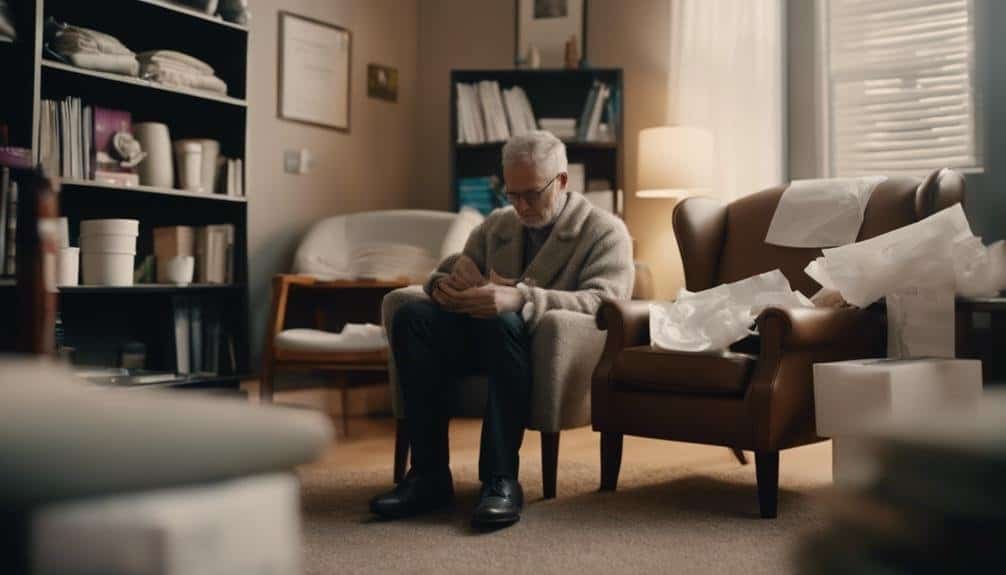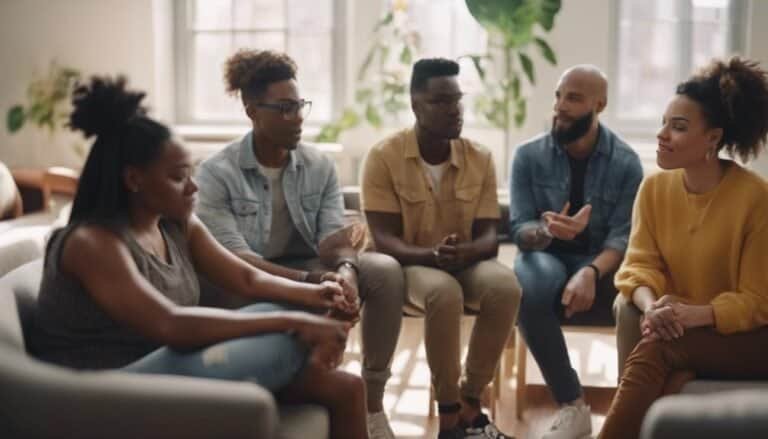Therapy for Grief and Loss
When the storm of grief clouds your horizon, therapy can be the beacon that guides you through the turbulent seas of loss.
With various approaches tailored to your needs, therapy offers a lifeline to navigate the tumultuous waters of sorrow.
Whether you seek solace in individual sessions, find comfort in shared experiences through group therapy, or explore healing through creative outlets, the path to healing awaits.
Discover how therapy can help you navigate the intricate emotions of grief and find a way to weather the storm.
Key Takeaways
- Therapy offers support and guidance through significant loss experiences.
- Individualized grief process exploration in a safe therapeutic space.
- Enhances coping skills, resilience, and promotes emotional healing.
- Various evidence-based therapy techniques tailored to unique grief needs.
Understanding Grief and Loss Therapy
If you have experienced a significant loss, seeking therapy for grief can provide you with valuable support and guidance through this difficult time. The grief process is unique to each individual, and starting on this healing journey may feel overwhelming. Therapy offers a safe space for you to explore your emotions, memories, and challenges that arise during this time of mourning.
During therapy for grief and loss, you’ll have the opportunity to work through the various stages of grief at your own pace. Your therapist will help you navigate feelings of denial, anger, bargaining, depression, and eventually, acceptance. This process of acknowledging and processing your emotions is critical for moving forward in your healing journey.
Therapy can provide you with coping strategies, tools for managing intense emotions, and a supportive environment where you can express yourself freely. Remember, you don’t have to go through this alone. Seeking therapy for grief and loss is a courageous step towards healing and finding peace amidst the pain.
Benefits of Seeking Therapy
When you’re struggling with grief and loss, seeking therapy can offer you valuable tools to cope and navigate through your emotions. Therapy provides a safe space for you to express yourself and work through the pain, ultimately aiding in your emotional healing process.
Therapy Improves Coping
Seeking therapy for grief and loss can greatly enhance your coping skills and emotional resilience. Therapy provides a safe space for you to explore coping strategies and receive valuable emotional support.
Through therapy, you can learn effective ways to navigate the healing process and develop new coping mechanisms. Therapists offer a range of therapeutic tools tailored to your specific needs, empowering you to better manage your emotions and reactions to grief and loss.
Enhances Emotional Healing
Therapy offers a nurturing environment that supports and accelerates emotional healing after experiencing grief and loss. During this healing process, emotional support is vital.
Here are some ways therapy enhances emotional healing:
- Validation and Understanding: Therapists provide a safe space to express your feelings without judgment, validating your experiences.
- Coping Strategies: Learn healthy coping mechanisms tailored to your needs, aiding in the healing journey.
- Self-Exploration: Discover and process complex emotions, fostering personal growth.
- Building Resilience: Develop resilience through therapy, empowering you to navigate future challenges.
- Creating Meaning: Work towards finding meaning in your loss, guiding you on a therapeutic journey towards acceptance and growth.
Types of Therapy Approaches
As you navigate through therapy for grief and loss, it’s important to explore different approaches that suit your needs.
Therapy techniques vary widely, from individual sessions tailored to your unique experiences to group therapy that fosters shared understanding and support.
Evidence-based therapy options provide structured methods that have shown effectiveness in helping individuals cope with their grief.
Therapy Techniques Overview
Exploring the various types of therapy approaches can offer valuable insights and support for processing grief and loss. When considering therapy techniques for grief and loss, here are some approaches that may be beneficial for you:
- Cognitive Behavioral Therapy (CBT): Helps in identifying and changing negative thought patterns.
- Mindfulness-Based Therapy: Focuses on being present in the moment and accepting feelings without judgment.
- Eye Movement Desensitization and Reprocessing (EMDR): Aids in trauma processing through bilateral stimulation.
- Expressive Arts Therapy: Utilizes creative expression to explore emotions and experiences.
- Body-Oriented Therapies: Recognize the mind-body connection, supporting healing through physical awareness.
These techniques can provide you with a supportive framework to navigate your grief journey.
Individual Vs. Group Therapy
In the journey of processing grief and loss, you may find that individual and group therapy offer distinct yet valuable avenues for healing and growth.
Individual therapy allows for personalized sessions tailored to your specific needs and challenges. It provides a safe space to explore your feelings, thoughts, and memories in-depth.
On the other hand, group therapy introduces you to a supportive community where you can connect with others who are also maneuvering their grief journeys. The group dynamics can foster a sense of belonging and understanding, offering different perspectives and shared experiences.
While individual therapy focuses on personal insights and progress, group therapy emphasizes collective support and learning from the experiences of others. Both approaches hold the potential to aid you in your healing process.
Evidence-Based Therapy Options
When considering evidence-based therapy options for grief and loss, you may find various therapeutic approaches that have been proven effective in supporting individuals through their healing journey. These interventions are backed by research studies and have shown clinical effectiveness in helping individuals cope with their grief.
Some of the evidence-based therapy options you might come across include:
- Cognitive Behavioral Therapy (CBT)
- Eye Movement Desensitization and Reprocessing (EMDR)
- Mindfulness-Based Therapy
- Acceptance and Commitment Therapy (ACT)
- Dialectical Behavior Therapy (DBT)
Each of these therapeutic modalities offers unique strategies to help you navigate the complexities of grief and loss in a supportive and effective manner.
Individual Counseling
Exploring through the depths of grief and loss can be incredibly challenging, but seeking individual counseling can provide you with a safe space to process your emotions and find support. In individual counseling, you can work closely with a trained therapist who can help you navigate the complexities of your grief journey. Together, you can explore coping strategies to manage the waves of emotions that come with loss. These coping strategies may include journaling, mindfulness techniques, or creating a support network.
Self-care practices are also vital during this time. Your counselor may guide you in developing self-care routines that nurture your mental and emotional well-being. This could involve activities such as exercise, meditation, spending time in nature, or engaging in hobbies that bring you joy. Remember, it’s crucial to prioritize self-care as you navigate the grieving process.
Through individual counseling, you can gain valuable insights, learn to cope with your grief in healthy ways, and gradually find healing and acceptance. Embrace this opportunity to prioritize your mental health and well-being during this challenging time.
Group Therapy Options
Traversing through your grief journey can also involve finding solace and support in group therapy options. Participating in group therapy can provide a sense of community and understanding that may help you navigate the turbulent waters of grief. Here are some reasons why group therapy can be beneficial:
- Shared experiences: Being in a group setting allows you to connect with others who are going through similar struggles, fostering a sense of belonging.
- Validation: Hearing others share their stories can validate your own feelings and experiences, making you feel less alone in your grief.
- Different perspectives: Group dynamics can offer various viewpoints and coping strategies that you may not have considered on your own.
- Peer support: Building connections with peers in the group can create a supportive network that extends beyond the therapy sessions.
- Emotional catharsis: Expressing your emotions in a group setting can be cathartic and healing, allowing you to release pent-up feelings in a safe environment.
In group therapy, the power of peer support and group dynamics can play a pivotal role in your healing journey.
Family Therapy Benefits
Families can benefit greatly from engaging in therapy together, as it fosters communication and understanding during times of grief and loss. Family dynamics play an important role in how individuals experience and process grief. In therapy, you have the opportunity to explore these dynamics in a safe and supportive environment. By delving into family dynamics, you can uncover underlying issues, improve relationships, and strengthen familial bonds.
One of the key advantages of family therapy is enhancing communication skills. Grief can often lead to misunderstandings or conflicts within a family. Through therapy, you can learn effective communication strategies that promote openness, empathy, and active listening. These skills not only help in navigating the grieving process together but also foster healthier interactions in the long run.
Family therapy provides a platform for each member to express their emotions, concerns, and needs. It offers a space where everyone’s voice is heard and valued, fostering a sense of unity and understanding. By engaging in therapy as a family, you set out on a journey towards healing and resilience together.
Cognitive Behavioral Therapy (CBT)
Cognitive Behavioral Therapy (CBT) can offer valuable insights and tools to help individuals navigate through the complexities of grief and loss more effectively. When dealing with these challenging emotions, incorporating CBT techniques into therapy sessions can make a significant difference in how you process and cope with your feelings. Here are some ways CBT can support you on your journey:
- Identifying Thought Patterns: CBT helps you recognize and challenge negative thought patterns that may be exacerbating your grief.
- Setting Realistic Goals: By setting achievable goals, CBT can help you regain a sense of control and direction in your life.
- Developing Coping Strategies: CBT equips you with practical coping strategies to manage overwhelming emotions.
- Enhancing Problem-Solving Skills: Learning problem-solving techniques can empower you to address difficulties associated with grief and loss effectively.
- Practicing Relaxation Techniques: CBT often incorporates relaxation techniques to help you alleviate stress and promote emotional well-being.
Mindfulness and Meditation Techniques
To enhance your emotional well-being and cope with grief and loss, exploring mindfulness and meditation techniques can provide valuable support and inner peace. Mindfulness practices, such as deep breathing and body scanning, can help you stay present in the moment, reducing anxiety and stress. By focusing on the sensations in your body and the thoughts passing through your mind without judgment, you can cultivate a sense of calm and acceptance.
Meditation benefits extend to fostering emotional awareness, allowing you to acknowledge and process your feelings surrounding the loss. Through regular meditation sessions, you can develop a deeper understanding of your emotions, leading to a greater sense of clarity and resilience. Incorporating relaxation techniques like guided imagery or progressive muscle relaxation can further aid in managing the physical and emotional manifestations of grief.
Art and Expressive Therapies
Exploring art and expressive therapies can offer a creative outlet for processing emotions and finding healing during times of grief and loss. Engaging in these therapeutic practices can help you navigate the complex emotions that come with grief in a supportive and non-verbal way. Here are some ways art and expressive therapies can benefit you:
- Art therapy benefits: Through art, you can express feelings that are hard to put into words, explore your inner world, and gain insights into your emotions.
- Expressive therapy techniques: Techniques like painting, drawing, sculpting, or even dancing can help release pent-up emotions and provide a sense of relief.
- Encouraging self-expression: These therapies encourage you to express yourself freely, without judgment, allowing for a deeper understanding of your grief.
- Promoting mindfulness: Engaging in creative activities can help you stay present in the moment and focus on the process rather than the outcome.
- Fostering connection: Creating art can be a way to connect with others who may be experiencing similar emotions, fostering a sense of community and understanding.
Grief Counseling for Children
Consider seeking grief counseling for children to provide them with the support and guidance they need to navigate their emotions during times of loss. A child-centered approach in grief counseling guarantees that the therapy is tailored to the unique needs of each child, allowing them to express themselves comfortably. Play therapy, a common technique used in child grief counseling, helps children process their grief through play and creative activities, making it easier for them to communicate their feelings.
Grief counseling for children focuses on helping them understand and cope with their emotions in a safe and nurturing environment. Through creative expression, such as art, storytelling, or music, children can explore their feelings and memories related to the loss. This process aids in grief processing, allowing children to work through their emotions at their own pace.
Frequently Asked Questions
Can Therapy for Grief and Loss Be Effective for Someone Who Has Experienced Loss a Long Time Ago?
When you’ve experienced loss long ago, therapy can still be effective. It helps you process emotions, develop coping mechanisms, and understand long-term effects. Childhood trauma can be addressed, resilience built, and healing achieved.
How Do I Know if I Need Individual Counseling or Group Therapy for My Grief and Loss?
Feeling lost in deciding between individual counseling or group therapy for grief and loss? Imagine exploring your personal journey in solitude or finding solace in group dynamics. Listen to your needs. Seek self-reflection or embrace community support. Trust your instincts.
Are There Any Alternative Therapy Approaches for Grief and Loss Besides the Ones Mentioned in the Article?
When exploring alternative therapy approaches for grief and loss, consider art therapy to express emotions creatively. Engage in mindfulness techniques for grounding and inner peace. Nature therapy and music therapy can also offer solace and healing during difficult times.
How Long Does It Typically Take to See Progress or Improvement Through Grief Counseling?
In counseling, progress assessment varies. Typically, improvement is seen within 8-10 sessions. Despite individual differences, counseling’s effectiveness in addressing long-term grief is proven. Trust the process and be patient with yourself.
Is It Possible to Combine Different Therapy Approaches for Grief and Loss, Such as CBT and Art Therapy?
Yes, combining different therapy approaches like CBT and art therapy can be beneficial. By integrating mindfulness techniques, journaling, outdoor activities, and music therapy, you can create a holistic healing experience that nurtures both your mind and soul.
Conclusion
To summarize, seeking therapy for grief and loss can provide you with the support and tools you need to navigate through your pain and healing process. Remember, ‘time heals all wounds.’
You aren’t alone in your journey, and there are professionals who are ready to help you every step of the way. Take the first step towards healing and reach out for the support you deserve.
You’re stronger than you think, and you’ll get through this.







